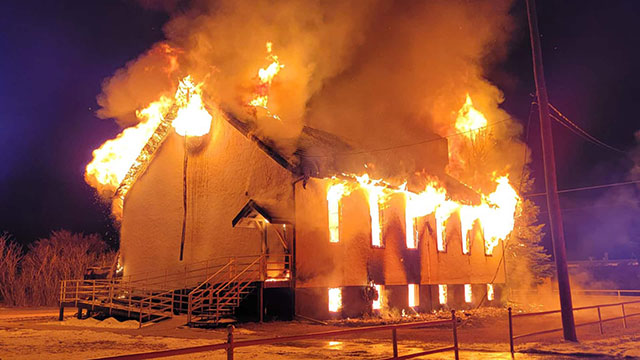Nearly 600 Canadian churches have been targeted in a wave of hate-fuelled arsons

For interview requests, click here
Religious freedoms and the right to worship have been hallmarks of civilized societies for centuries. The preamble to Canada’s Constitution affirms that our country is built on principles recognizing the supremacy of God and the rule of law. Yet, in defiance of both, nearly 600 Canadian places of worship have suffered arson in recent years – an act that is profoundly un-Canadian.
This troubling statistic came to light through an inquiry by Member of Parliament Marc Dalton. Federal government records revealed 592 arsons targeting places of worship between 2010 and 2022. Alarmingly, these incidents spiked from 58 in 2020 to 90 in 2021 before dropping to 74 in 2022.
This sharp increase coincides with explosive claims from May 2021, alleging the discovery of the remains of 215 children at the former Kamloops Residential School. These claims ignited national outrage and were a catalyst for a wave of church burnings. Ground-penetrating radar identified anomalies at the site, but no human remains have been confirmed. Experts have suggested that a 1924 septic field located in the area could account for the detected irregularities.
 |
| Recommended |
| Eco-extremism in Canada is becoming a growing threat
|
| Who is to blame for the church burnings across Canada?
|
| It’s too easy to blame Christianity for residential school deaths
|
Despite the significant impact of these claims, investigations have yet to confirm the presence of human remains. Although $8 million in federal funding has been allocated to examine the site, no remains have been found, and how the funds were used remains unclear. A full excavation is long overdue to verify these claims and, if remains are discovered, to conduct autopsies that ensure truth and accountability.
Prime Minister Justin Trudeau condemned the wave of church burnings as “unacceptable and wrong” but also described their motivations as “real and fully understandable.” While such a response may have aimed to balance empathy with criticism, it fell short of quelling tensions.
The arson attacks far outnumber those perpetrated by the Ku Klux Klan during the 1920s, a dark period in Canadian history. The Klan, which opposed non-Protestants and non-whites, targeted churches like St. Joseph’s Catholic Church in Sarnia and killed 10 people in a fire at Saint-Boniface College in Winnipeg. The Klan also burned the Notre-Dame de Québec Basilica-Cathedral in Quebec City and bombed St. Mary’s Roman Catholic Church in Barrie, Ont., leading to the imprisonment of three members in 1926. While the Klan’s presence in Canada quickly waned, these recent church burnings suggest a troubling resurgence of intolerance, albeit under a different guise.
Just last month, the 110-year-old Notre-Dame-des-Sept-Allégresses Catholic Church in Trois-Rivières, Que., burned to the ground. Authorities have not yet confirmed whether arson was involved, but the incident highlights an ongoing pattern of attacks on sacred spaces.
Adding fuel to these metaphorical fires is the Canadian Anti-Hate Network (CAHN), funded by $640,000 in federal grants. Established to monitor and combat hate groups in Canada, CAHN has drawn criticism for its methods and characterizations. Its handbook, 40 Ways To Fight The Far-Right: Tactics for Community Activists in Canada, includes controversial tactics such as infiltration, doxing (the act of publicly revealing private or personal information about an individual or organization without their consent, typically with malicious intent), and encouraging employers to fire individuals associated with targeted groups. The guide also labels socially conservative organizations, such as Campaign Life Coalition and Liberty Coalition Canada, as “hate movements.” While CAHN claims its work promotes inclusivity, its approach often fosters division rather than dialogue.
Dalton’s Bill C-411, the Anti-Arson Act, offers a practical solution. The bill would impose mandatory five-year sentences for first offences of arson against places of worship, increasing to seven years for subsequent offences. While critics may argue that mandatory sentencing raises concerns about proportionality, this legislation sends a strong message that hate-motivated crimes will not be tolerated.
When respect for the supremacy of God and the rule of law falters, rights give way to wrongs. It’s time to extinguish both the literal and figurative fires threatening our nation. Canada must restore respect for people of faith, their right to worship, and the sanctity of their places of worship.
Lee Harding is a Research Associate for the Frontier Centre for Public Policy.
Explore more on Hate crimes, Coercive progressivism, Alt-right, Alt-left, Religion, Rights and responsibilities
The views, opinions, and positions expressed by our columnists and contributors are solely their own and do not necessarily reflect those of our publication.
© Troy Media Troy Media is committed to empowering Canadian community news outlets by providing independent, insightful analysis and commentary. Our mission is to support local media in building an informed and engaged public by delivering reliable content that strengthens community connections, enriches national conversations, and helps Canadians learn from and understand each other better.
